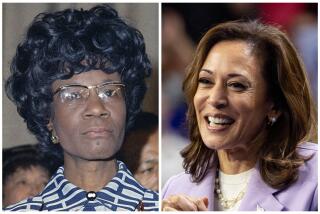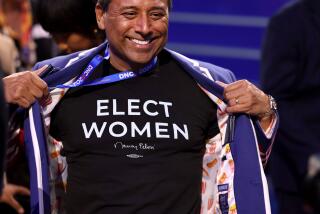Handling bad news -- Dick Cheney’s way
Dan Bartlett was President Bush’s counselor until July. But now he’s on the lecture circuit, and when he’s not dissing the GOP’s candidates (Fred Thompson is the “biggest dud”), Bartlett is telling insider’s stories about Vice President Dick Cheney and, frankly, how much trouble it was to work with the taciturn Washington veteran.
There was, for instance, the Cheney hunting incident in south Texas, when he accidentally blasted a buddy in the face with birdshot. Years before, Bartlett had faced another bad-news hunting incident when Gov. George W. Bush was photographed shooting a bird, which upon closer examination by the photographer, turned out to be a protected species.
As soon as he got that news, Bartlett sprang into action, and by the time newspaper presses ran that night with the photo, the incident had already been officially reported to state authorities, a fine was paid and Bush had issued an apology. The result: a one-day story that you, in fact, probably never heard before reading this.
The way Bartlett describes the Cheney incident, it took forever to reach anyone with Cheney, and the White House aide discovered to his horror that the hunting party had already been strategizing for 24 hours. They planned to give the story to a Corpus Christi reporter, except that, it being the weekend, no one could find him.
Bartlett finally reached the vice president and urgently presented another option: getting him on the phone with a national press pool to explain the entire incident in his own words ASAP. There was dead silence. Then, the vice president intoned he would handle it his way. Which Cheney did.
And, not coincidentally, his hunting story is still the subject of talk show jokes.
Giuliani to speak at conservative forum
Stop the presses! Rudy Giuliani, the former New York mayor with the liberal social views, has become the last Republican presidential candidate to accept an invitation to appear at a “values voter” conference in Washington on Saturday.
The conference, expected to draw some 2,000 conservatives, is organized by the Family Research Council, an influential conservative group whose leader, Tony Perkins, has been among those quietly talking about running a third-party evangelical candidate if someone with a pro-choice stand on abortion and gay rights such as Giuliani gets the GOP nomination.
Perkins; James Dobson, the founder and head of Focus on the Family; and a handful of other conservatives recently met in Salt Lake City to discuss the third-party option. Dobson, who supported George W. Bush in 2000 and 2004, has made several outspoken statements this year about Republicans he would not support. Prime among them is Giuliani.
The truth about the Florida flap
House Speaker Nancy Pelosi has said what everyone has known all along:
The Democratic National Committee’s removal of all of Florida’s 2008 convention delegates for violating party rules about scheduling state primaries before Feb. 5 is meaningless.
Speaking with a covey of political reporters at a Washington lunch, Pelosi was asked what she thought of the delegate termination. “That will be determined by the presidential nominee,” said Pelosi, who will serve as honorary chair of the convention in August in Denver.
“The Democratic National Committee is the ruling authority now,” she said, “but the tradition is that the presidential candidate will decide.”
Even if Alaska’s Mike Gravel were the Democratic nominee, he wouldn’t be sufficiently suicidal to write off any state with as many electoral votes (25) as populous Florida.
‘Bush’ a four-letter word for Republicans
The official transcript from MSNBC of Tuesday’s debate among the Republican presidential candidates does, indeed, make it official: The men vying to keep the White House in GOP hands appear loath to utter the current occupant’s name.
President Bush’s name did not escape the lips of any of the candidates with even a ghost of a chance of capturing the Republican nomination. And that blockade held for more than two hours.
In a particularly telling sign of this, the first time a candidate invoked his surname, it was in reference to his father: Sam Brownback noted he’d worked on trade policy during the 1989-93 presidency of George H.W. Bush.
Brownback went on to use the term “Bush administration” -- meaning the one in office -- twice when answering questions about Iraq. He praised it on military matters; criticized it over efforts to create a cohesive Iraqi government. Tom Tancredo made a negative reference to “the Bush administration” while discussing trade, and Ron Paul broached the president’s name sarcastically.
It causes one to wonder what sort of speaking slot the nominee-to-be will reserve for the sitting president at next summer’s Republican National Convention in Minnesota.
It’s Hillary Clinton
vs. Iowa history
Sit down with any ranking member of Hillary Clinton’s campaign brain trust, and almost instantly you will hear an impassioned discourse about the enthusiasm and excitement she sparks among women voters.
But if the time has arrived for glass-ceiling-shattering at 1600 Pennsylvania Ave., Clinton may first have to overcome voter reluctance toward women candidates in one state that looms above others in presidential politics.
Nedra Pickler of the Associated Press notes that Iowa -- all-important, showered-with-attention, site-of-the-opening-caucus Iowa -- is one of only two states that have never sent a woman to the Senate, the House or the governor’s office.
It shares that dubious distinction with . . . Mississippi.
Perhaps it’s simply a fluke that female contenders for Congress or governor are 0-for-forever in the Hawkeye State.
Iowa is also a state where, in the 2000 census, Latinos were 3% of the population, blacks 2% and Asians 1%. It’s a state where, on caucus night, turnout is minuscule -- 10% or so of eligible voters, even when one or both parties have intense fights. And an inordinate percentage of those who do show up are in their 50s, 60s or 70s -- meaning that issues of importance to younger generations, such as improving public schools, may get short shrift.
Remind us again who decreed that Iowa should play such a crucial role in picking presidents and why any attempt to alter that process should be thwarted?
--
Excerpted from The Times’ political blog, Top of the Ticket, at latimes.com/topoftheticket.
More to Read
Get the L.A. Times Politics newsletter
Deeply reported insights into legislation, politics and policy from Sacramento, Washington and beyond. In your inbox three times per week.
You may occasionally receive promotional content from the Los Angeles Times.










